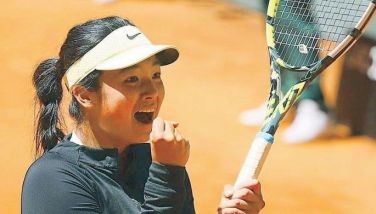Sidelights: A second look at sepak takraw
KUALA LUMPUR, Malaysia – During the last 40 years, since the Philippines joined what is now the Southeast Asian Games, sepak takraw has always been a cause of embarrassment for Filipinos. The reason is that the Philippines has never figured prominently in the sport which, ironically, is the country’s national sport before arnis took its place in 2009. Its numerous bronze medals came from events where there are only three competing teams.
Sepak is the Malay word for kick, and “takraw” is the Thai word for a woven ball. The official name sepak takraw is the result of a compromise between Thailand and Malaysia, the sport’s powerhouses since the Southeast Asian Peninsular Games (1958-1977), precursor of the 40-year-old SEAG. Sepak takraw is a must event of the SEA Games, which is offering an average of 12 gold medals in every edition.
People from Southeast Asia are natural players of this Malay sport, which involves kicking a round ball made of wood or rattan, which is grown in all parts of Southeast Asia. The ball may now be made of rubber materials with holes in it.
Sipa is enjoyed particularly in the countryside probably as far back as over 500 years ago when the game was first played in the Malayan Peninsula. But it fell into disrepute when parents started making sipa from softdrinks bottle caps, wrapped with feathers or light ribbons, during the American occupation.
Since sepak takraw is an ASEAN indigenous sport, it has been a must event in the SEAP and SEA Games and customarily staged in the first days of the SEA Games. Malaysia and Thailand are making good use of their golden wins in this native sport to kick off their quest for overall supremacy in the Games. The Malaysian SEAG offers 12 gold medals.
Things may be looking up for sipa with the silver medal finish in chinlone on Aug. 16, barely three days before the opening of the 2017 SEA Games.
The breakthrough win, the very first silver medal of the Philippines here, could provide the impetus for its reinstatement as the national sport, which can be our new source of gold medals since the medal-rich sport is now also a regular fixture of the Asian Games. In fact it is now played practically by all countries of Asia, including the Middle East, and in various parts of Europe and North America.
Now that a silver medalist is making heads turn, it’s time for the government to give sipa a second look.
- Latest
- Trending






























